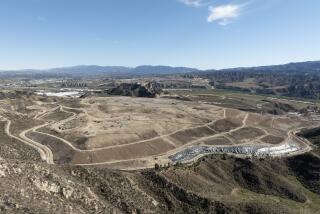Nuclear Dump Plan ‘in Serious Trouble’ : Waste: Bush Administration officials concede they will miss deadline for opening site in Nevada. The plan faces logistical problems and fierce opposition from Nevada politicians.
- Share via
WASHINGTON — The Bush Administration, in a major setback to the nuclear industry, is preparing to officially concede that it will be unable to meet its schedule for opening a long-term dump for highly radioactive nuclear waste that has been planned for Yucca Mountain in Nevada, Administration officials said Tuesday.
“Progress hasn’t been made with the site,” a senior Administration official said. “The program is in serious trouble.”
The problems are twofold, both technical and political. On the technical level “everyone, members of Congress, the executive branch, has known for some time that there are serious problems” with meeting a deadline of 2003 for opening the waste site, the official said.
On the political level, “you’ve got some Nevada politicians out there that have staked their careers on stopping this thing,” the official added.
The new delays may push back the opening of the waste site by three years, according to Robert Loux, executive director of Nevada’s Nuclear Waste Project Office. Deputy Energy Secretary W. Henson Moore said the delays could be as much as seven years beyond the 2003 date.
Several steps that would be necessary to put the waste site into business have not yet been taken. For example, under legislation passed during the last year of the Reagan Administration, the federal government is supposed to appoint a negotiator to work out terms with Nevada for accepting the burden of housing the nation’s nuclear waste dump. So far, no action has been taken on that appointment.
Finding a suitable site for a permanent nuclear waste facility has been a major priority for the nuclear industry and for nuclear power supporters within the Administration.
According to the Department of Energy plan, 70,000 metric tons of deadly waste from commercial nuclear reactors and weapons plants would be buried 1,000 feet under Yucca Mountain, 100 miles north of Las Vegas.
A 116-mile grid of tunnels in the mountain’s volcanic rock would house the waste repository. Steel canisters would hold the nuclear waste, which would come by truck or rail for 26 years. The site would be then be sealed.
Federal officials have said the mountain’s geology and its remote location in a Nevada desert make it an ideal site for the waste dump. The rock must prevent radioactive leakage from reaching the underground water table for 10,000 years, when most of the radioactive elements will have decayed.
Some scientists, however, have questioned the mountain’s stability because several earthquake faults run through it. There is also concern about possible volcanic activity in the area. And some scientists have said fractures in the volcanic rock might allow moisture to seep through to the storage vault, where it could corrode the steel waste canisters.
If this scenario occurred, it could introduce radioactive materials into the water table, which stretches across the California border to Death Valley National Monument, 25 miles to the west.
Energy Secretary James D. Watkins has been stymied in efforts to persuade Nevada to grant the air- and land-use permits required to begin work sinking exploratory shafts in the mountain to determine the geologic suitability of the site. The Nevada Legislature also passed a bill earlier this year declaring that no high-level nuclear waste could be buried in the state.
The delays will clearly compound waste storage problems already faced by the nation’s 114 commercial plants. Nuclear utilities have contributed nearly $4 billion toward construction of the dump.
With previous delays already postponing the estimated opening of the repository for five years, operators at many of the plants are running out of storage space for the deadly waste and have been forced to expand temporary facilities for storing the waste on their property--an expensive undertaking shouldered by consumers.
Loux said the developments Tuesday amount to a major restructuring of the Department of Energy’s Yucca Mountain program.
Times staff writer Jenifer Warren contributed to this story.
More to Read
Sign up for Essential California
The most important California stories and recommendations in your inbox every morning.
You may occasionally receive promotional content from the Los Angeles Times.













